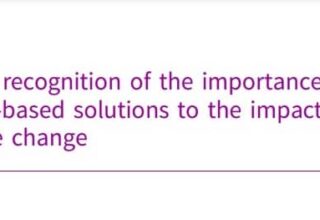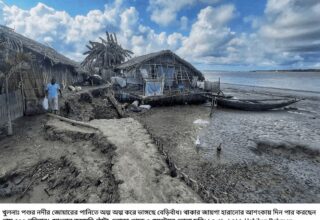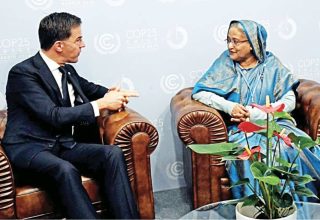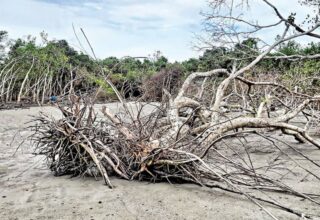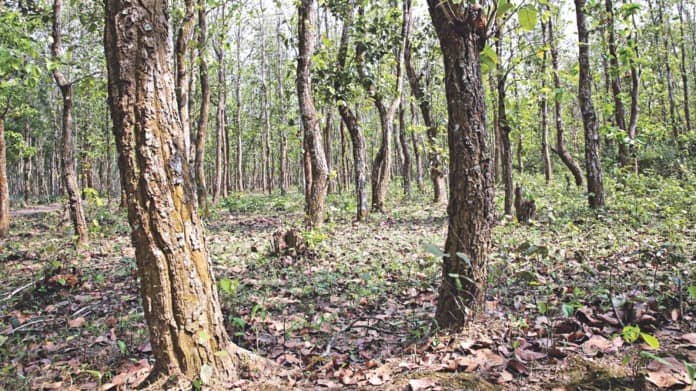
In 2020, Nature-based Solutions, or NbS, has emerged as a much-talked-about environmental concept in Bangladesh. While the Covid-19 pandemic has put the whole world in turmoil, we do have other challenges to tackle—climate emergency, disaster risks, food and water insecurities, extreme poverty, and unprecedented biodiversity loss. In simple terms, NbS are the actions we take with the help of nature to overcome these societal challenges.
When we protect our ecosystems like forests and wetlands, sustainably manage their resources, restore them when these are in bad shape, or create a new one to get its services, we practice NbS. But we perform these activities keeping in mind one or more societal challenges, like climate change. And, most importantly, we design and implement our activities in a way that they improve our wellbeing and also give biodiversity benefits.
So, we can see that NbS is not a completely new idea. It is rather a recent attempt to bring together different existing nature-based activities and approaches—like establishing protected areas like the Sundarbans, creating a “green belt” along our coastline since 1965, participatory management of Hakaluki haor, or ecosystem-based adaptation to climate change in Satkhira—under one umbrella called NbS.
As I look back now, I see three milestones generating strong interest in NbS in Bangladesh in 2020.
First, NbS activities in Bangladesh now have a go-to platform—the NbS Bangladesh web portal (www.nbsbangladesh.info)—thanks to the collaboration between the International Centre for Climate Change and Development (ICCCAD) and the University of Oxford, UK. This portal has created a good opportunity to bring together cases and documents capturing Bangladesh’s long NbS experience in the form of peer-reviewed research papers, grey literature, and relevant policy and planning instruments.
The ICCCAD-Oxford initiative has also established the NbS Bangladesh Network. By being part of this network, interested individuals and organisations can take forward the NbS conversation in Bangladesh, share experiences, and undertake joint actions.
The second milestone is an improved understanding of NbS in Bangladesh through discussions and publications. The first webinar on NbS was organised by ICCCAD in May, giving the audience an opportunity to learn about NbS and how to harness their benefits. The American Center’s NbS webinar provided a platform for sharing NbS experiences from experts from Bangladesh Forest Department, UNDP, and the Center for Natural Resource Studies. The “NbS Digital Dialogues” organised by the University of Oxford was this year’s largest global NbS event. In the session on people’s participation in NbS, Bangladesh government’s 20-year effort to sustainably manage Tanguar haor was showcased, which was later captured in an op-ed by The Daily Star in August.
The ongoing Rohingya refugee crisis started its fourth year on August 25, 2020. An opinion piece in The Daily Star highlighted the nature-based actions that different agencies were taking in the highly degraded camp areas through plantation, hilly slope and stream bank stabilisation, and wetland creation, for example.
In September, the United Nations Environment Programme (UNEP) published a brief entitled “Rethinking Nature: A Pathway towards Sustainable Development?” Written by two Bangladeshi environmentalists, this article showed that NbS is not only about climate action (SDG 13) or biodiversity conservation (SDGs 14 and 15), but also about improving urban resilience (SDG 11), community empowerment and ensuring gender equality (SDGs 1, 2 and 5), promoting sustainable production and consumption (SDG 12), and achieving economic growth (SDG 8).
Young environmentalists working in different research organisations showed increasing interest in NbS. They tried to understand different aspects of it, like the role of indigenous knowledge in NbS, or NbS as an alternative development pathway for Bangladesh, and shared their understanding and thoughts on different platforms.
The third milestone took the NbS conversation to a higher level so that our policies and practices appreciate the benefits of ecosystem-based actions. Just before the Covid-19 lockdown, on March 15, a meeting was held at the Bangladesh Planning Commission with ICCCAD to discuss how NbS could be integrated in the country’s planning processes, such as in the Eighth Five-Year Plan. An analysis presented in that discussion showed that Bangladesh was well ahead in appreciating nature-based actions and approaches as seen in the Bangladesh Delta Plan 2100, Bangladesh Climate Change Strategy and Action Plan (BCCSAP, 2009), the Seventh Five-Year Plan (2016−2020), and the Nationally Determined Contributions (NDC) submitted to the United Nations Framework Convention on Climate Change (UNFCCC) in 2015. Among others, the participants recommended inclusion of NbS in government project formulation documents, like the Development Project Proforma (DPP), and establishing a NbS database to guide planners and practitioners to choose appropriate nature-based solutions and include them in development projects and programmes.
In August, the ICCCAD and the University of Oxford analysed the NbS scenarios in Bangladesh from the perspectives of knowledge, practice, policy, and planning. Their policy brief, entitled “A Roadmap for Nature-based Solutions in Bangladesh: Promises and Challenges”, gives us a comprehensive direction towards nature-based actions for Bangladesh.
The UK holds the presidency of the 26th Conference of Parties (COP26) to be held in November 2021 in Glasgow, Scotland. The UK has long been a partner of Bangladesh in fighting climate change, which has gained further momentum in 2020. On December 8 and 9, the UK-Bangladesh Climate Partnership Forum brought together experts, practitioners, and politicians from both countries in two webinars to discuss the experiences, challenges, and opportunities they share on nature-based solutions and approaches to fight climate change.
Despite the restrictions and limitations imposed by the pandemic, it has been a promising year for raising the profile of NbS as a concept in Bangladesh. So, what awaits us in 2021?
There are a number of events already lined up to continue the NbS conversation. The first Gobeshona Global Conference (January 18-24, 2021) will have NbS as one of its central themes. The University of Oxford is organising a NbS conference in July where Bangladesh’s experience is expected to be highlighted. Given that NbS is one of the core themes of the COP26, we can expect more activities in Bangladesh in this regard leading up to November 2021.
In terms of creating new knowledge of NbS, a number of ongoing research projects are expected to give us more understanding of and insight into Bangladesh’s NbS, once these are complete. We may also expect the NbS Bangladesh Network to gain further momentum and contribute towards evidence-informed policy discussions.
Regarding broader policy and strategic planning scopes, we believe the Eighth Five-Year Plan will maintain its focus on nature-based approaches as it did in the Seventh Five-Year Plan. The projects to be designed under the Bangladesh Delta Plan 2100 will include NbS, as discussed on March 15 at the Bangladesh Planning Commission. Bangladesh is currently preparing the National Adaptation Plan (NAP) with support from the Green Climate Fund (GCF). Given the country’s long-term commitment and experience with nature to protect its people from climate change impacts, NbS should be one of the core adaptation approaches of the “Bangladesh NAP” due in May 2021. We also expect that the revised NDC, to be submitted to the UNFCCC by December 31, will keep NbS as the core actions as Bangladesh updates its targets to reduce greenhouse gas emissions by 2025.
While we show our enthusiasm in using nature to solve our problems, we must be careful not to interpret the NbS concept wrongly. NbS means creating forests with diverse species and maintain biodiversity, not planting the same species mile after mile. NbS must empower the indigenous and local people and engage them in their design and implementation, and must not be injected from the outside. NbS is not the ultimate solution to climate change by reducing carbon from our air, however. Without rapidly decarbonising our economy and adopting clean energy strategies, it is impossible to survive the climate crisis. As we continue the conversation in 2021, we must be careful about possible misapplication and abuse of the NbS concept.
Originally this article was published on December 24, 2020 at Daily Star
Dr. Haseeb Md. Irfanullah is an independent consultant working on environment, climate change, and research systems.
His Twitter handle is @hmirfanullah


